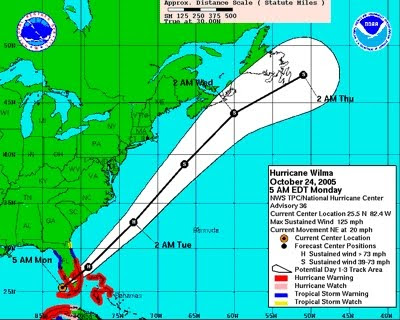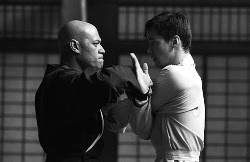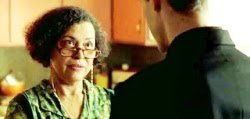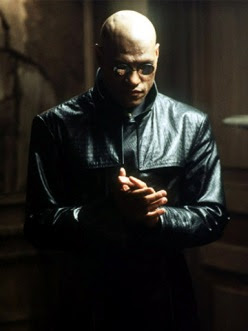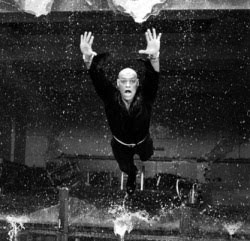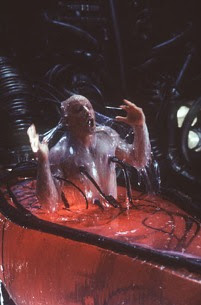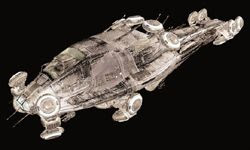Stage 1, Call to Adventure = Meeting Trinity, who offers the answer to the question "What is the Matrix?"To cement his identity as a hero, the adventurer must make a return to his old life. If I identify places as Neo's two realms—the Matrix as the place he leaves and the "real" world as the place of his journey—then working out the last portion of the hero cycle is quite difficult. Neo bounces between the Matrix and the "real" world each time he is plugged in/unplugged, so he has already revisited his old place of existence before The Official Big Return required at the end of the adventure.
Stage 2, Refusal of the Call = Threatening to leave the car that will deliver him to Morpheus just because Switch wants Neo to lift his shirt
Stage 3, Supernatural Aid and Amulet = Morpheus and his red pill
Stage 4, Crossing of the First Threshold = Waking up in a goo-filled pod
Stage 5, Belly of the Whale = Getting swallowed into the steel belly of the Nebuchadnezzar
Stage 6, Road of Trials = Training aboard the Nebuchadnezzar [Martial arts matches with Morpheus, jump program, Agent-training program, etc.]
Stage 7, Meeting with the Goddess = Advice from Spoon Child
Stage 8, Woman as Temptress = The Oracle telling Neo that he is not the One
Stage 9, Atonement with the Father = Neo's realization that he does indeed share Morpheus' level of commitment
Stage 10, Apotheosis = Breaking into the high-security building to rescue Morpheus from the Agents
Stage 11, The Ultimate Boon = Successfully freeing Morpheus and returning him to the Nebuchadnezzar
Campbell provides a loophole, however. He says that the adventure can happen in "a distant land, a forest, a kingdom underground, beneath the waves, or above the sky, a secret island, [or] lofty mountaintop." But the cycle does not have to happen in a place necessarily. Campbell notes that the adventure can be a journey inside, a "profound dream state," and that other locations for adventures "might be multiplied, ad infinitum." So if we consider Neo's adventure as a journey of identity, it is much easier to map out the next six stages. He moves from Thomas Anderson, an ineffectual geek, to the One, a transformed being. Then, at the end of the movie, circumstances require that Neo revisit his old identity as "Mr. Anderson."
Return, Stage 12: The Refusal of the Return
Campbell says that the hero must return to complete the cycle—although he also notes that "the responsibility has been frequently refused." Apparently, the ecstasy of the adventure is so powerful that some heroes will not revisit their old existence. And why would someone who has just realized his potential for power want to go back to unhappy corporate bosses at best, handcuffs and jail time as the worst-case scenario?
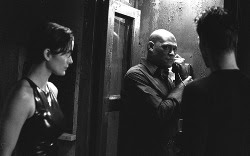 After Morpheus' rescue, Neo has the opportunity to return to his old life as Thomas Anderson. This opportunity arrives after he has supervised Morpheus and Trinity's safe exit from the Matrix to the Nebuchadnezzar. Before he too can use the pay phone to escape, he sees Agent Smith on the subway platform. During his training in the "real" world, he has learned that an Agent = run like hell, and Neo glances at the stairs up to the street as he considers preserving his new life by escaping capture. This moment when he contemplates flight is his refusal to return to "Thomas Anderson," his old existence.
After Morpheus' rescue, Neo has the opportunity to return to his old life as Thomas Anderson. This opportunity arrives after he has supervised Morpheus and Trinity's safe exit from the Matrix to the Nebuchadnezzar. Before he too can use the pay phone to escape, he sees Agent Smith on the subway platform. During his training in the "real" world, he has learned that an Agent = run like hell, and Neo glances at the stairs up to the street as he considers preserving his new life by escaping capture. This moment when he contemplates flight is his refusal to return to "Thomas Anderson," his old existence.Return, Stage 13: Magical Flight
Campbell says that during the return, the hero is "supported by all the powers of his supernatural patron ... or complicated by ... magical obstruction." A great example of this stage is Odysseus as he journeys home to Ithaka after the war at Troy. Athena supports his return by supervising his progress and advocating for his success; Poseidon, however, thwarts his return to make Odysseus pay for blinding the Cyclops, Poseidon's son.
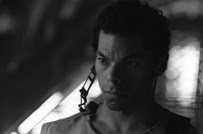 Each time Morpheus' crew re-enters the Matrix, someone—Tank—watches over the prostate physical bodies and advises the replugged members by phone. As we know when Cypher dispatched first Apoc, then Switch, and when Trinity and Tank almost "pulled the plug" on Morpheus after his capture, the people in the "real" world can control life and death in the Matrix. This ability gives them super-human or god-like power.
Each time Morpheus' crew re-enters the Matrix, someone—Tank—watches over the prostate physical bodies and advises the replugged members by phone. As we know when Cypher dispatched first Apoc, then Switch, and when Trinity and Tank almost "pulled the plug" on Morpheus after his capture, the people in the "real" world can control life and death in the Matrix. This ability gives them super-human or god-like power. As Neo gets ready to make his own return, we find Tank, Trinity, and Morpheus at the computer monitors aboard the Nebuchadnezzar watching Neo's decisions, monitoring the rest of his transformation, and protecting his physical body under their care, thus satisfying the requirements for magical flight. Since the now defunct Cypher also had god-like power over life and death for the crew plugged into the Matrix, he can count as Neo's Poseidon. The challenges that Neo will face in this portion of the cycle resulted from the betrayal of Cypher, whose sabotage has provided the Agents with the information that they need to find not only Neo but also the Nebuchadnezzar.
As Neo gets ready to make his own return, we find Tank, Trinity, and Morpheus at the computer monitors aboard the Nebuchadnezzar watching Neo's decisions, monitoring the rest of his transformation, and protecting his physical body under their care, thus satisfying the requirements for magical flight. Since the now defunct Cypher also had god-like power over life and death for the crew plugged into the Matrix, he can count as Neo's Poseidon. The challenges that Neo will face in this portion of the cycle resulted from the betrayal of Cypher, whose sabotage has provided the Agents with the information that they need to find not only Neo but also the Nebuchadnezzar.Return, Stage 14: Rescue from Without
The hero may need inspiration to leave the excitement of the adventure and return to his old life. Campbell says, "The world may have to come and get him." To explain this stage to my students, I played "Get to Me" by Train. The singer recognizes that the hero is away on an adventure but begs that person to come home:
Parasail or first class mail
Get on the back of a Nightingale
Just get to me I don't care just get to me
Prokeds, mopeds take a limousine instead
They ain't cheap but they're easy to find
Get on the highway point yourself my way
Take a roller coaster that comes in sideways
Just get to me - yeah
Go on hitch a ride on the back
of a butterfly
There's no better way to fly
To get to me
 Neo's rescue from without does not include a lover anxious for his return. His call back to his old life comes when Agent Smith address him with two words on the subway platform: "Mr. Anderson." Contempt drips from the Agent's voice.
Neo's rescue from without does not include a lover anxious for his return. His call back to his old life comes when Agent Smith address him with two words on the subway platform: "Mr. Anderson." Contempt drips from the Agent's voice.Agent Smith is the authoritative suit from Neo's past in the Matrix. There on the subway platform, Neo has two options—either run from the Agent, the strategy Morpheus' crew has taught him, or confront this being who symbolizes everything wrong from Neo's old life. When Agent Smith says, "Mr. Anderson ..." just as Neo is about to bolt up the stairs, Neo hears the summons from his previous existence. Instead of fleeing that life, he faces it, armed now with the confidence and new abilities he has acquired on his adventure.
Return, Stage 15: Crossing of the Return Threshold
To cross the return threshold requires that the hero step back across the line of demarcation that separates his old life from the realm of the adventure. Campbell summarizes the stage like this: "The hero adventures out of the land we know into darkness; there he accomplishes his adventure, or again is simply lost to us, imprisoned, or in danger; and his return is described as a coming back out of the yonder zone."
When Neo engages Agent Smith in combat, he does not know his future. He may be captured, never to return to the Nebuchadnezzar. At that moment, when he fully engages his old life in the form Agent Smith, he has crossed the return threshold.

Return, Stage 16: Master of the Two Worlds
"Freedom to pass back and forth across the world division," claims Campbell, "is the talent of the master." Having mastered the realm of the adventure, the hero must now demonstrate that his old life offers no challenge that he cannot defeat.
Neo has already shown his mastery of the adventure realm when he rescues Morpheus. Engaging Agent Smith in combat transports Neo back to his old life, but he must first acclimate before he demonstrates that he is a master there as well. He wins the first battle when Agent Smith gets out-maneuvered and clobbered by the train, but it is a short-lived victory as Agent Smith finds a new receptacle, and Neo resorts to his adventure behavior and flees. In the next showdown, he momentarily loses the fight as the Agents gun him down in the hotel hallway. Trinity, however, who has access to his dying physical body on the ship, offers her love and commands action, "Now get up!" just as Athena would protect Odysseus. When Neo awakes—returning from the dead—he engages the Agents once more, this time stopping the bullets that explode from their guns and easily overcoming Agent Smith in hand-to-hand combat. In this scene, he illustrates his mastery of his old life. He can bend everything and everyone in it to his will.

Return, Stage 17: Freedom to Live
At the end of the cycle, the hero has a fuller understanding of his own potential and abilities than does the person who never accepts the call. Campbell describes the adventurer thus: "Powerful in [his] insight, calm and free in action ... the hero is the conscious vehicle of the terrible, wonderful Law, whether his work be that of butcher, jockey, or king." No matter his place in life or what he has, the hero has the confidence to continue, unburdened by the anxieties that plague his fellows who never moved through the arduous challenges of the cycle.
At the end of the movie, Neo proclaims his fearlessness and confidence in his abilities as he address the Matrix itself. He explains to the machines which once ruled him that he has transcended their control and plans to free all of the other "batteries" that they use for power. Then he demonstrates his mastery by blasting into the sky like Superman, a skill I wish he showed off less in the two inferior movies that follow.
 The big problem with both Reloaded and Revolutions is that the two sequels offer no new hero cycle for the viewers to enjoy. Neo has become static, his period of growth over, and no new potential hero steps forward to begin his/her cycle.
The big problem with both Reloaded and Revolutions is that the two sequels offer no new hero cycle for the viewers to enjoy. Neo has become static, his period of growth over, and no new potential hero steps forward to begin his/her cycle.

